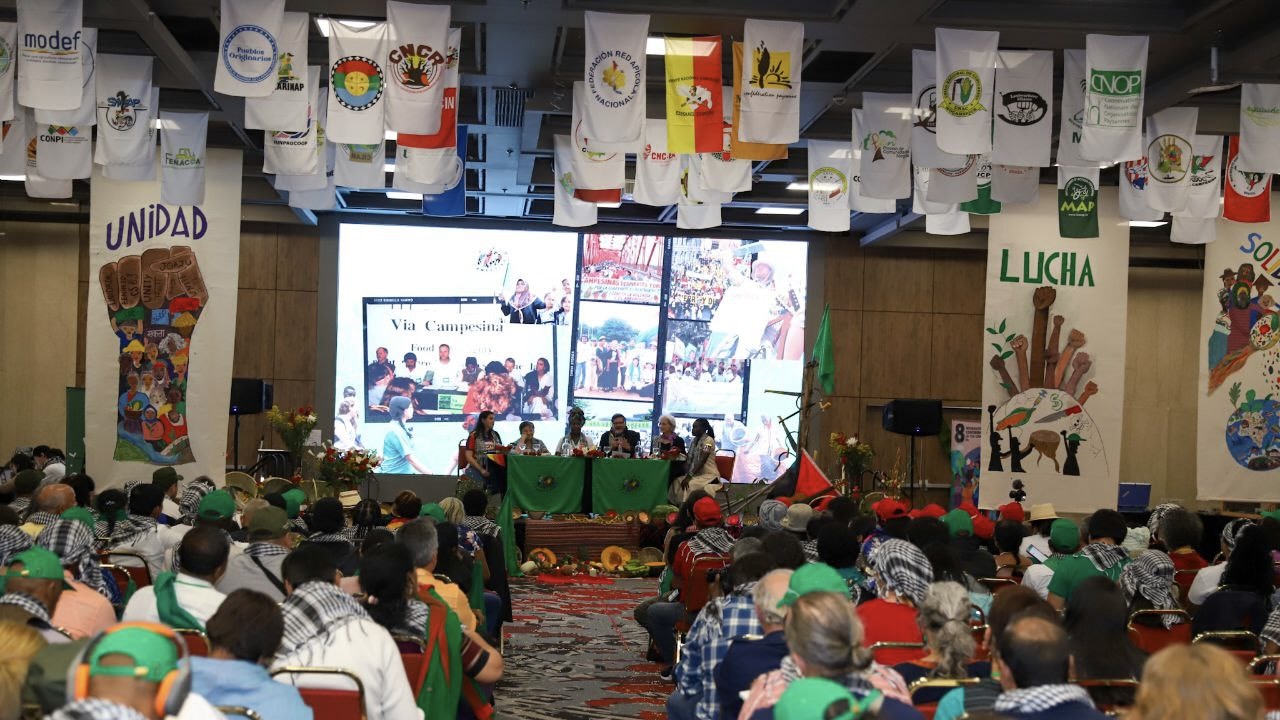La Via Campesina (LVC) brings together 182 national organizations from 82 countries. This movement encompasses the diversity of rural populations, including peasants, fisherfolk, migrants, agricultural workers, Indigenous peoples, and pastoralists. It constitutes the primary bulwark of resistance against extractivism and agribusiness in Africa, the Americas, Europe, and Asia. Faced with the interests of a few predatory multinational corporations and governments aligned with their agendas, La Via Campesina is committed to building and defending international solidarity, peace, democracy, peasant rights, agroecology, and peasant feminism on a global scale, thus ensuring the Food Sovereignty of peoples.
In Bogotá, over 500 delegates from member organizations of LVC are gathering from December 1-8 to discuss, analyze, and promote concrete solutions to the political, social, economic, and climate crises affecting humanity. Morgan Ody, General Coordinator of La Via Campesina, emphasizes the importance of this 8th International Conference to strengthen unity and devise mobilization actions in response to global crises and armed conflicts: “It is essential to demonstrate that, as peasants, we are paving the way for a possible future for humanity. In the face of us, capitalism, extractivism, imperialism, and patriarchy are constructing a dark and impossible future, a future of destruction and misery. Through peasant struggles, we aspire to restore hope. We are aware that this will only be possible through solidarity and unity in struggles on an international scale.”
Nury Martínez, from Fensuagro, the host organization of the 8th International Conference in Colombia and a member of the Political Coordination of La Via Campesina for the South America Region, highlighted the importance of these spaces to strengthen alliances and advance with all social organizations towards fundamental changes: “We must understand what our central slogan means because the pillar of Food Sovereignty propose structural changes in societies. After 30 years, our initiatives must be broader, going beyond the right to food; they must address the challenges that humanity faces today,” she declared.
Over these 30 years of organization, La Via Campesina has succeeded in uniting peasants from the Global North and South in the defense of fundamental rights such as land and Indigenous seeds. This unity has been forged in opposition to powerful actors of transnational capital seeking to criminalize dissent and promote global policies exacerbating crises. These actors include the World Trade Organization, the International Monetary Fund, and the World Bank, supported by Free Trade Agreements and the power of large corporations, thus threatening the livelihoods of peoples, peasants, and life on the planet.
La Via Campesina presents concrete proposals for the struggle for social and environmental justice against violence, poverty, and hunger. Representing 70% of global food production, peasants promote agroecological and resilient practices that feed the world and cool the planet. They have also played a leading role in significant milestones, such as the approval of the Declaration on the Rights of Peasants. This approval is the result of over 17 years of collective struggle at the United Nations and aims to guide public policies in countries to ensure the rights of those who produce healthy food for the population. However, it also warns against political setbacks on a global scale, the advance of right-wing authoritarianism and conservatism, exacerbating the situation of peasants, impoverished and exploited by these states and multinational companies.
International Conferences are the most important decision-making, evaluation, and planning body of the movement. They have taken place in various parts of the world, such as Belgium in 1993, Mexico in 1998, India in 2000, Indonesia in 2013, and the Basque Country in 2017. Within the framework of this 8th International Conference of La Via Campesina, the 5th Youth Assembly, the 6th Women’s Assembly, the Diversity Meeting, and the Men Against Patriarchy Meeting will also be held.
In this context, the political decision to hold this 8th Conference of La Via Campesina in Colombia responds to the movement’s commitment as a guarantor of the peace process, especially regarding point 1 related to Integral Agrarian Reform. Moreover, the recent recognition of peasants as subjects of rights in the Colombian constitution can inspire other governments and states to strengthen public policies guaranteeing fundamental rights for a dignified life in rural areas.





